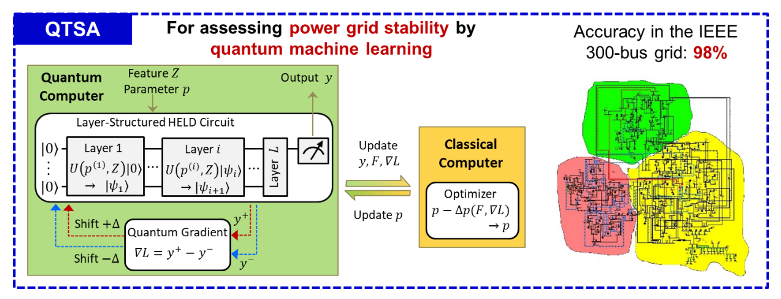Researcher on Future Power Technology joins ECE Dept.: Prof. Yifan Zhou
Introduction
Dr. Yifan Zhou joined the Stony Brook ECE faculty as an assistant professor this past September. Prior to this, she was a postdoc in the ECE department at Stony Brook, working with Prof. Peng Zhang. She received her Bachelor's degree with the highest distinction in 2014 and her Ph.D. degree in 2019, both from the Department of Electrical Engineering at Tsinghua University in China, a world-wide top university.
Her research focuses on learning-based, verifiable smart grids, which collaboratively integrates (1) machine learning, (2) quantum computing, and (3) formal verification for enabling intelligent, resilient, adaptive, and secured power system operations and supporting extreme renewable energy integration.
Figure: Overview of the established works of learning-based, verifiable smart grids.

The common point of her research directions is that all three are driven by the urgent challenges that arise from the increasing penetration of the highly-uncertain, low-inertia renewable energy generations. The U.S. government has envisioned wind and solar energy to provide 90% of U.S. electricity by 2050. Consequently, we will have ever-increased renewable energies connected to power grids through the inverter interfaces, with renewable energy’s associated uncertainties.
These three areas will now be outlined in Prof. Zhou’s own words:
Learning-based Power System Analytics
- What they are – My research in this direction leverages machine learning techniques to offer scalable and tractable power system analytics and decision-making.
- Why they are important – With the deep deployment of renewable energies, traditional model-driven analytics are gradually incapable of handling the complicated operating scenarios of today’s power grids, such as massive distributed resources, low transparency of behind-the-meter devices, and ultra-fast converter-driven transients.
- What do we gain –By providing a path to discovering knowledge from data, learning-based power grid analytics is promising for enabling efficacious solutions and relieving the computational burdens of modern power grids with renewables at different levels.
- My contribution – The application of machine learning in power grids is actually very broad. For me, I mainly focus on developing learning-based methods to tackle the dynamic, transients and stability issues in renewable-dominated power grids and to support an automatic and intelligent way for model discovery, dynamic verification, transients simulation and stability-assured control of modern power grids.
Quantum-Enhanced Power Analytics
- What they are – My research in this direction explores the potential of quantum computing to resolve power system computational problems.
- Why they are important – Scalable and efficient grid analytics is a key to successfully operating large interconnected power systems.
- What do we gain – Quantum computing holds the promise for unprecedentedly scalable and efficient algorithms. This potential provides hope for revolutionizing power system computations and achieving ultra-efficacious power system analytics.
- My contribution – Although quantum computing has huge potential, today, we are still in the noisy-intermediate-scale quantum (NISQ) era, meaning quantum computers are sensitive to noise and their capabilities are pretty limited. My vision is to leverage power system knowledge to explore domain-specific quantum-power algorithms with improved noise-resilience so that they can be pursued on today’s noisy quantum computers. Our recent products, such as QEMTP and QTSA, are the first series of Quantum-power analytics in the world that have been truly verified on real quantum hardware.
Figure: Illustration of the Quantum machine learning-based power grid Transient Stability Assessment (QTSA)

Verifiable Power System Operations
- What they are – This research direction exploits formal analysis (especially reachability analysis) to verify power system behaviors under uncertain scenarios. Reachability Analysis involves finding future favorable and unfavorable system states from a current system state.
- Why they are important -- Unlike the traditional generations, renewables cannot be accurately predicted. Therefore, dependable verification of power system behaviors under massive uncertainties is indispensable for ensuring the system safety and stability.
- What do we gain – By formal analysis, we obtain verified performance of power grids covering various uncertain behaviors, making the traditional intractable scenario-by-scenario checking unnecessary.
- My contribution -- I have established a series of verification approaches regarding different operational aspects of power systems, exemplified by the steady-state ReachFlow, small-signal ReachEigen, large-signal ReachDyn, and safety probability SReachDyn. Those analytics jointly provide dependable, tractable, and comprehensive verification of power systems’ behaviors under massive uncertainties.
Benefits for students in working on these projects
The power and energy area is developing very fast – there will be GW-levels renewables in the coming years. Massive integration of renewable energies is significantly reshaping modern power systems by introducing highly uncertain and low-inertia inverters. This provides huge opportunities in both industry and academia. Students working in these directions could be highly compatible for positions in power utilities, national labs, universities, etc.
Meanwhile, formal analysis, machine learning, and quantum computing are all cutting-edge
techniques not only applicable to power grids, but also usable for broad applications.
Therefore, working on these projects can also provide students with multi-discipline
knowledge in those directions as well as their engineering applications.
Research finding its way into teaching
Currently, Prof. Zhou is offering a graduate course -- “Microgrids”. The course covers fundamental knowledge of renewable-dominated microgrids as well as cutting-edge technologies of microgrid analytics, where she includes three lectures to introduce how machine learning, quantum computing, and formal methods can benefit power grid operations. She is also advising senior design projects on quantum computing and quantum machine learning.
On the other hand, Prof. Zhou finds research-related lectures provide a fantastic way to let the students (especially undergraduate students and junior graduate students) experience how cutting-edge technologies find their way into engineering problems. She believes no matter what area the students are studying , training them with a scientific mindset for identifying and analyzing real-world problems and inspiring their creative ideas can always benefit their careers.
